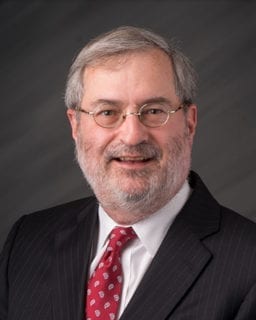When you ask Paul Volker, M.D., FAAFP, assistant professor of family and internal medicine at DMU, about being named the 2019 Medical Educator of the Year by the Iowa Academy of Family Physicians (IAFP), he emphasizes two points: that there are a lot of excellent medical educators, including at DMU, out there, and that every physician should be an educator.
“The term ‘doctor’ is Latin for ‘teacher.’ It’s something every physician should be doing in their scope of practice, teaching patients about their health,” he says. “The tradition of teaching medicine to those who come after us is as old as the Hippocratic Oath.”

A Fellow of the American Academy of Family Physicians and recipient of the IAFP’s 2015 Lifetime Achievement Award, Dr. Volker has four generations of educators in his family. His paternal grandmother taught elementary school, his maternal grandfather taught for a few years in a one-room rural schoolhouse and both of his parents were professors at Iowa State University. His daughter, Anne Hughes, now is a middle and high school teacher in Detroit. Before he joined the DMU faculty in 2015, he was a preceptor for third- and fourth-year medical students in his practice in Boone, IA. Still, teaching as a faculty member was a “big change” from teaching as a full-time clinician.
“In my practice, I was at the hospital and clinic every day, 6 a.m. to 7 p.m.,” he says. “I had a lot of catching up to do. I could barely put together a PowerPoint.”
That didn’t dampen his passion for teaching, however.
“I’d been given this gift of receiving a great education and taking care of patients. I didn’t want to throw that away,” he says.
Noreen O’Shea, D.O., FAAFP, assistant professor in the department of behavioral medicine, medical humanities and bioethics, nominated Dr. Volker for the IAFP award for his teaching, wealth of experience and willingness to take on a variety of responsibilities. He heads the University’s rural medicine elective and serves as director of the family medicine clerkship for the third-year osteopathic medical class. He earned his Certificate of Added Qualifications in Geriatrics during his first year at DMU and then assumed the role of running the geriatrics course. He’s also a preceptor in the DMU Family Medicine Clinic.
“He has been a favorite of the third-year medical students who have enjoyed his wit and wisdom and special expertise,” Dr. O’Shea stated in her nomination.
Humbly referring to himself as “a guy with a lot of stories to tell,” Dr. Volker knows they’re what medical students are hungry to hear, especially during their intensely didactic first and second years. He praises DMU for having students learn from and work with clinical faculty in those two years in addition to faculty in the basic sciences. He believes that’s a factor in the University being one of the nation’s top producers of family medicine physicians.
“There’s got to be a reason for that. We have a lot of close contact with students, and they can see what the practice is like,” he says.
Dr. Volker sees patients in the DMU Family Medicine Clinic four half-days per week and teaches students in the Simulation Lab and the Standardized Performance Assessment Lab (SPAL). He also guides students in the University’s “Science Knowledge Integrated into Patient Presentation” sessions, or SKIPPS, which have an active learning, case-based learning format. Working in small groups, students receive a patient case for which they make a diagnosis, request tests if needed and propose treatment; after a set time, the groups then present their results. In these settings, he says, “students get the chance to think through a case, and no one gets hurt” regardless of their diagnosis and treatment.
During spring break in March, Dr. Volker will accompany a group of DMU students, as he did in 2019, on a service trip in the Dominican Republic through the University’s global health program. There, students and clinicians set up a clinic in a different rural community every day to treat or refer patients and provide health information.

“It’s exhausting – the crush of people, the limited pharmacy, the frustration that having to work through translation can cause,” he says. “But the experience it gives students is almost priceless. And any force that shows we’re globally connected is a good thing.”
Obviously a teacher at heart, Dr. Volker is glad to be one at DMU.
“Students talk about the vibe of collegiality on campus, that people help each other,” he says. “That’s true of the faculty, too. You go to faculty meetings, and everyone is on the same page. You can’t buy that atmosphere. It’s a great place to work.”

